|
|
|
Sort Order |
|
|
|
Items / Page
|
|
|
|
|
|
|
| Srl | Item |
| 1 |
ID:
179404


|
|
|
|
|
| Summary/Abstract |
In light of the current Rohingya crisis in Myanmar, this article investigates the emergence of Islamophobia in colonial Burma. Focusing on the under-examined Islamophobic riots that broke out countrywide in 1938, my research reveals that a nascent fascist movement used Muslims as a scapegoat for political and economic crisis. The colonial agribusiness economy had collapsed during the Great Depression, while the vast contract labour system of the Indian Ocean had brought millions of low-wage Indian migrants to Burma, causing a glut in the labour market. Burmese socialism provided a popular response to these issues. To compete, Burmese fascism emerged to appeal to a rising sense of nationalism, racially scapegoating Indians and the religion of Islam as the exploiters, colonizers, and invaders behind Burma's problems. Using the racialized term kala to conflate the ideas of colonizer, Indian, and Muslim, Burmese fascists inflamed hatred against Indian Muslims, Indian Hindus, and even indigenous Muslims, such as the Rohingya. By revealing the origins of this racialization, this article both deconstructs the lasting Burmese perception of the Rohingya as ‘Bengali immigrants’ and provides a generalizable case study into how races and racisms develop from specific historical factors and political movements. It also argues that the British amplified fascist ideas in Burma by focusing repression on movements that directly challenged their material control, such as socialism and communism. Therefore, it highlights how ruling classes often prefer nationalistic movements because they redirect popular unrest from the project of overthrowing structural factors to that of eliminating scapegoated minorities.
|
|
|
|
|
|
|
|
|
|
|
|
|
|
|
|
| 2 |
ID:
179407
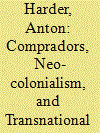

|
|
|
|
|
| Summary/Abstract |
This study of China's relations with Algeria and India shows that the Mao-era emphasis on the transnational function of class made it fundamentally sceptical of the privileged status of the nation-state and transformed Beijing's posture towards the Third World in the late 1950s and early 1960s. Beijing's sense of a growing matrix of transnational class forces damaged relations with India, a key Third World moderate, and spurred closer ties with non-state, revolutionary movements like the Algerian Front Libération Nationale (FLN). Thus Beijing retreated from the post-Korean War phase of moderate diplomacy during which it had eschewed support for revolution abroad under the rhetoric of the ‘Five Principles of Peaceful Coexistence’. This article relates Beijing's class analysis of the growing challenges in its relations with India to the arc of interactions between the communist Chinese, the FLN revolutionaries, and the newly post-colonial Algeria. It demonstrates that because of Beijing's understanding of how the domestic class category ‘comprador’ facilitated ‘neo-colonialism’ (an emerging Third World concept), China's anti-imperialism must be understood through its perception of the transnational function of class forces. This understanding of the post-colonial dilemma—how far to maintain or sever ties with the West, which grew partly from Chinese perceptions of Indian politics—explains the curious difficulty that Beijing faced in maintaining cooperative relations with many newly independent nations like Algeria. The emphasis on transnational class struggle also provides an interpretation of Beijing's foreign policy which is intimately linked to domestic politics and affirms the contribution of ideology to the Sino-Soviet split.
|
|
|
|
|
|
|
|
|
|
|
|
|
|
|
|
| 3 |
ID:
179411


|
|
|
|
|
| Summary/Abstract |
On 12 November 1970, the Bhola Cyclone swept across the southern districts of East Pakistan, killing over 300,000 people. Small islands were swept away and dead bodies of humans and cattle lay strewn across the devastated landscape. Following the news of the destruction, journalists, students, artists, and political workers rushed to the affected area with basic relief supplies, without waiting for the Military Law Administration (MLA) to intervene. The cyclone's occurrence just three weeks prior to the first general elections in Pakistan added a new dimension to the already simmering political crisis. The extensive media coverage of the disaster brought the pitiful state of infrastructural development and lack of governance in East Pakistan under local and global scrutiny. The cyclone and the corresponding issues soon became embroiled within the larger political demand for regional autonomy. The MLA came under attack from sections of East Pakistan's politicians, press, and public, as well as international political actors, for its poor disaster governance. This article uses the Bhola Cyclone of 1970 as the lens to explore the complex interconnections between environmental disasters and a key issue of governance. While the Bhola Cyclone has been a subject of recent discussions, this article uses a disaster-politics analytical framework to understand the disaster's role in the subsequent political turbulence and the emergence of Bangladesh.
|
|
|
|
|
|
|
|
|
|
|
|
|
|
|
|
| 4 |
ID:
179409
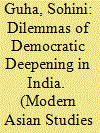

|
|
|
|
|
| Summary/Abstract |
The political assertion by subalterns (specifically lower and backward castes) that India witnessed from the 1990s onwards, and the formation of governments by parties representing these groups in Uttar Pradesh and Bihar, two electorally critical North Indian states, contributed significantly to the deepening of India's democracy. But these lower caste governments met with vehement resistance from privileged strata, and from a section of state actors themselves, in particular, the bureaucracy. These governments adopted a range of strategies to counter this resistance in turn, which had the effect of bringing the procedural and substantive elements of democracy into sharp conflict. The project of lower and backward caste empowerment was defined by a politics of levelling, which placed great value on instantly visible egalitarian outcomes, even when these could only be achieved by denting the rule of law and weakening public institutions. But it was precisely on account of its ability to deliver instant egalitarian fixes (albeit on an ad-hoc and sporadic basis) that this politics commanded so much legitimacy among subordinate groups. Drawing on ethnographic research conducted in Uttar Pradesh, and secondary literature on backward caste politics in Bihar, this article explores the consequences that this prioritizing of right outcomes over proper procedures had on public culture in North India. It argues that this prioritizing of consequences over means bred a widespread impatience with a procedural conception of democracy, which was seen as obstructing the modalities that went to secure justice in real life.
|
|
|
|
|
|
|
|
|
|
|
|
|
|
|
|
| 5 |
ID:
179408
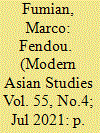

|
|
|
|
|
| Summary/Abstract |
This article analyses the modern historical trajectory of the word fendou (奋斗, ‘struggle’), from its emergence in the early twentieth century to the present. Originally embedded in a Social Darwinist philosophy of struggle, fendou was later co-opted by the Chinese Communist Party (CCP). As one of its key ideological shibboleths, it was typically used to mobilize the Chinese people to ‘struggle’ for the goals of the nation. However, as these goals varied significantly in the course of the history of the People's Republic of China (PRC), the actual meanings and uses of fendou evolved accordingly, following shifts in the ideological paradigms that characterized the different eras. By studying how this term was used as an ideological keyword over time, it is possible to observe the continuities and discontinuities in the visions of struggle, and the relevant ‘pedagogies of struggle’, promoted in different periods by the Chinese state. The article, in particular, analyses the use of fendou in both contemporary official discourse and popular culture, suggesting that in promoting the formation of a competitive subject in line with the aims of the ‘socialist market’, fendou still, at the beginning of the twenty-first century, expresses and disseminates a predominantly Social Darwinist world view.
|
|
|
|
|
|
|
|
|
|
|
|
|
|
|
|
| 6 |
ID:
179405


|
|
|
|
|
| Summary/Abstract |
In 1896, Sir Halliday Macartney, counsellor of the Qing London legation, detained the revolutionary Sun Yat-sen on legation grounds in an attempt to deport him back to China. Since then, the image of the legation as an ossified extension of a despotic government has dominated public imagination. This article proposes a new way of understanding the legation's action: it exemplifies the legal activism of Qing diplomats in recovering judicial sovereignty that had been compromised by the presence of extraterritoriality and colonialism. Legations represented a broad range of interests of China through diplomatic negotiations and legal mediations, and brought unresolved disputes between foreign ministers and the Zongli Yamen in Beijing to the attention of their home governments. This article analyses the mediation and collaboration performed by the London legation between the various levels of the Qing government and the British Foreign Office. It argues that Qing legations and their diplomatic representation abroad were essential to the construction and imagination of China as a sovereign state.
|
|
|
|
|
|
|
|
|
|
|
|
|
|
|
|
| 7 |
ID:
179410
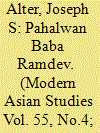

|
|
|
|
|
| Summary/Abstract |
In the view of many people, Baba Ramdev embodies the practice of modern yoga in twenty-first century India. A tremendously successful entrepreneur, infamous ‘godman’ with political ties, and a highly visible TV personality, he is also a vocal supporter of pahalwani (Indian wrestling) as a way of life and of wrestling in India as a national sport. Beyond sponsorship of tournaments and support for a new professional wrestling league, he promotes a form of modern, nationalistic masculinity that draws on the ‘ideals’ of yoga, competitive athleticism, ‘Hindu’ conceptions of embodied power, and fetishized Vedic asceticism. In complex and often contradictory ways, Baba Ramdev's embodiment of these ideals shapes the bio-morality of wrestlers as they train, compete, and endorse his products. Critically analysed in terms of gender theory, his sponsorship of wrestling belies deep contradictions in religious nationalism, middle-class modernity, and in the gendered morality of both wrestling as a sport and yoga as a form of practice.
|
|
|
|
|
|
|
|
|
|
|
|
|
|
|
|
| 8 |
ID:
179403
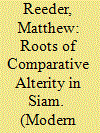

|
|
|
|
|
| Summary/Abstract |
This article identifies a moment of conceptual innovation—the 1830s to the 1850s—in which everyday artists and writers in Siam were tasked with creating comparative representations of the peoples of the world. Although their compositions took a variety of formats, they departed from earlier representations of alterity by devoting equal attention to each ‘type’, including the Thai themselves. This approach is best exemplified in three mid-nineteenth-century works: (1) a set of archetypal portraits of about 20 peoples painted on the shutters of a major Buddhist monastery, (2) sculptures of 32 peoples at the same monastery with a short poem describing each one, and (3) entries defining terms for peoples in an early Thai–Thai dictionary. The systematic formatting of these works drew on similar compositions circulating across the nineteenth-century globe. Yet, despite the presence in Bangkok of foreign interlocutors and imported books and prints, the mid-nineteenth-century compositions preserve ethnic tropes and practices of expression specific to Siam. In addition, the agents of intellectual innovation were not restricted to the usual princely or missionary protagonists. It was a motley cast of anonymous artists, local scholars, and middling officials who tapped traditional genres of composition and local markers of differentiation to render the peoples of the world as comparable, generic, and fixed.
|
|
|
|
|
|
|
|
|
|
|
|
|
|
|
|
| 9 |
ID:
179406


|
|
|
|
|
| Summary/Abstract |
This article investigates the circular intra- and transimperial movements of medical experts from colonial India in three imperial settings. The analysis of the trajectories of José Camillo Lisboa, Paramananda Mariadassou, and Mary Poonen Lukose highlights, first, how crucial freedom of movement—not only between parts of the same empire, but also across empire borders and between their metropoles as well as their colonies—was for individuals; secondly, how questions of citizenship, the recognition of degrees and certificates, and notions of gender, race, class, and place of origin played a role in enabling or preventing Indians living in Portuguese, French, or British India from studying or working elsewhere; and thirdly, how this in turn had an effect on their potential social mobility, which depended on the historical contingency of time and place, and the opportunities and limitations in these contexts. The article argues that through their chosen careers and their sociopolitical activities they expanded conventional notions of citizenship and lived as global citizens.
|
|
|
|
|
|
|
|
|
|
|
|
|
|
|
|
|
|
|
|
|